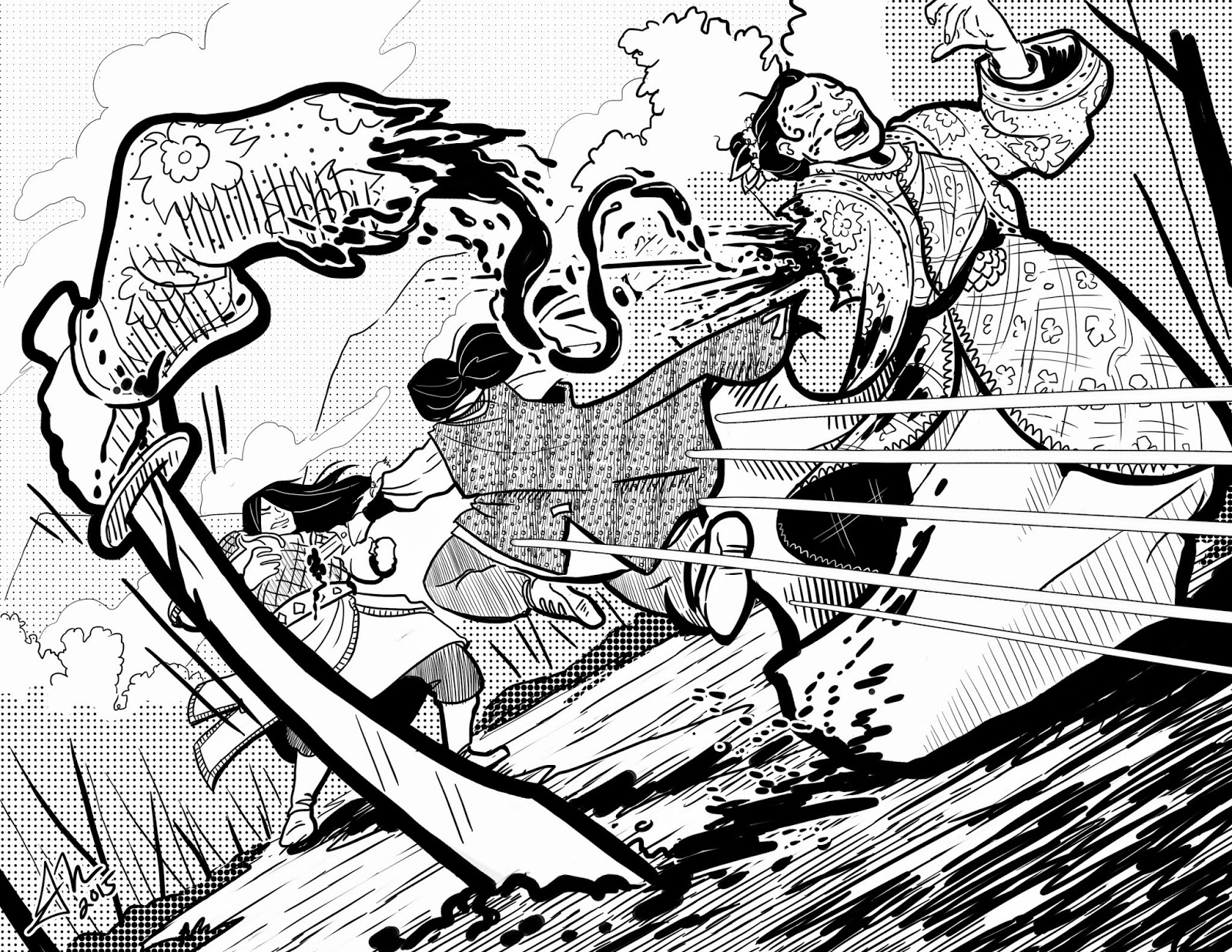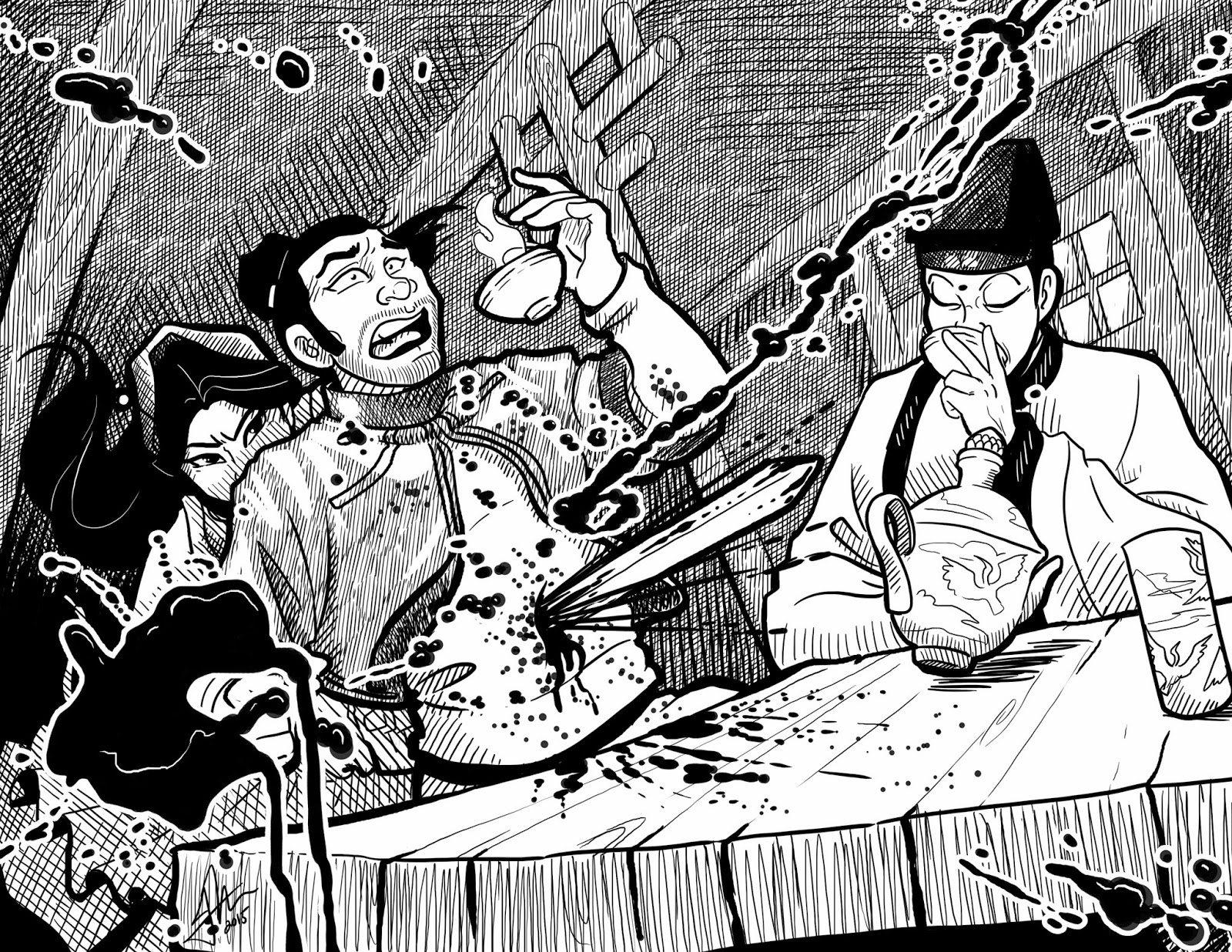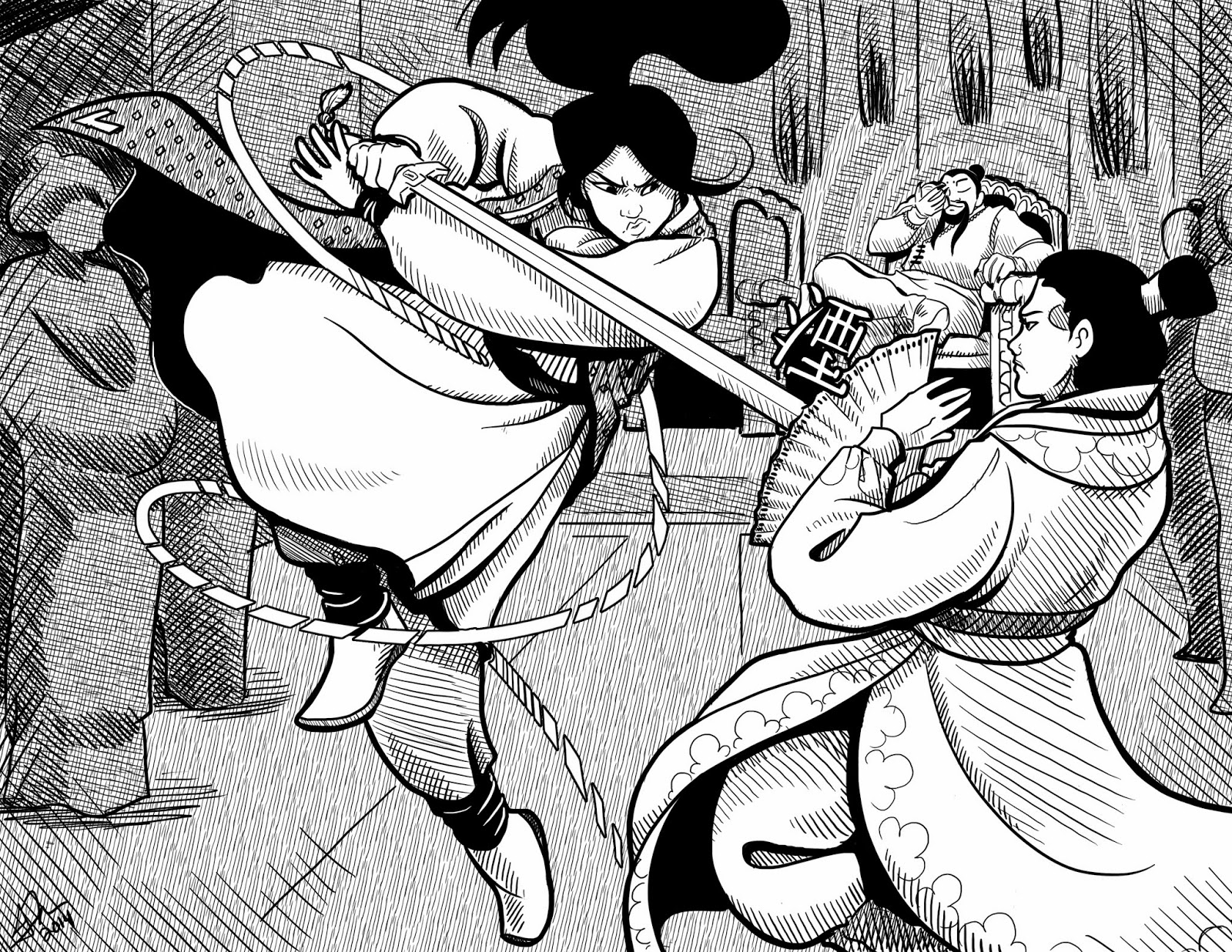
Wandering Heroes of Ogre Gate RPG (Image: Bedrock Games)
I’m a fan of wuxia movies like Crouching Tiger, Hidden Dragon (German Title: Tiger & Dragon, Ang Lee, 2000). I grew up with The Water Margin (Die Rebellen vom Liang Shan-Po, Nippon TV, 1973-1974, Buchvorlage: Die Räuber vom Liang-Schan-Moor).
In the early 80s, my parents allowed me to watch this Japanese TV show about a Chinese literature classic. Since then I’m a sucker of movies like Detective Dee and the Mystery of the Phantom Flame (Detective Dee und das Geheimnis der Phantomflammen, Tsui Hark, 2010) and House of Flying Daggers (Zhang Yimou, 2004). The wuxia genre with the often copied, still unmatched adventure tales of martial arts heroes in ancient China offer a broad range of stories.
Just a few weeks ago I found Brendan Davis‘ fine roleplaying homage – the Wandering Heroes of Ogre Gate RPG. I contacted him for an interview. I hope you enjoy our Q&A.

Wandering Heroes of Ogre Gate RPG: Lady Plum Blossom … (Image: Bedrock Games)
Brendan, wow, your quite new roleplaying game Wandering Heroes of Ogre Gate is clearly inspired by wuxia genre classics like Dragon Gate Inn (German: Die Herberge zum Drachentor by cult director King Hu, 1966). Please give us a brief introduction to your game and setting.
Wandering Heroes of Ogre Gate is a wuxia RPG set in a fictional setting inspired loosely by Song Dynasty China, wuxia drama series and films. It also has fantasy and supernatural elements to create a range of play that spans from classics like Lady Hermit to strange tales like Painted Skin. The players are martial heroes with incredible abilities of lightness kung fu, internal energy, swordplay and pressure point techniques. The world they inhabit is fueled by the violent conflict of the martial sects they belong to.
The core mechanic of the game is a d10 dice pool. You roll a number of d10 equal to your skill rank, take the single highest result and compare it against a Target Number (either set by the GM or by your foe’s defense ratings). If you meet or exceed the number you succeed. If you get a 10, that is a Total Success (which is a kind of crit).
At the moment you offer your Wandering Heroes of Ogre Gate RPG (~ 500 pages) as a free or Pay-what-you-want download. Why do you that and when can we expect to buy printed copies?
We originally planned it as a free game. Of course that was when I was only intending to release Ogre Gate as a small supplement for Sertorius. However, as I started working on it, I found it was what I wanted to devote my time to developing so it expanded into a full ruleset and setting. It has all the content you would expect from one of our regular games as a result. Because we’d originally announced it as free, I figured the best way to keep that promise while also enabling us to put out support material, was to release it as Pay-what-you-want. The print version is available for $49.99.

Wandering Heroes of Ogre Gate RPG: Lady Whiteblade (Image: Bedrock Games)
In my opinion, wuxia is usually furious and very action-oriented. Roleplaying games like the otherwise excellent Qin: Warring States (Cubicle 7) “fail” to appropriately emulate the genre, because they are too rules-heavy and slow. How does your game try to catch the very special atmosphere of these gravity-defying movies and stories?
I do agree that action is important in wuxia. But personally I think Qin is a great game. I believe what you are describing is the tradeoff every game like this has to make and each one makes a different decision in terms of where to reside on the rules spectrum. The more rules, the more you can emulate the techniques and powers themselves found in wuxia. But it is also true, things can get slower. The less rules, the faster the game moves, but you can lose that emulation of the individual techniques. And I think in wuxia, individual techniques are really important. It isn’t an attempt to realistically model real fighting, it is a genre with conventions, often fantastic, that are inspired by traditional martial arts. In Wandering Heroes of Ogre Gate we strike something of a middle ground.
Ogre Gate is based around Kung Fu Techniques, using the Network system, which we’ve developed over the years in games like Horror Show and Servants of Gaius. This incarnation of Network is more robust than previous ones in order to accommodate the presence of Kung Fu Techniques. But the core system is on the fast side. I usually describe it as more rules medium because all of your Kung Fu moves are individual abilities that you select (sort of like spells in Sertorius). Each Kung Fu techniques essentially has two modes: normal and cathartic. The normal mode you can perform all day, every day, without any problem. Cathartic uses are more powerful, and rely on deeper reserves of Qi energy. The Qi doesn’t need to be tracked by anytime you use a technique cathartically, you risk unbalancing your Qi. Every Technique is associated with a particular skill in the game, and that is what you roll when using it (so I would use Arm Strike for Ringing Strike of the Hand, and I would use Athletics for Drift of the Butterfly Fish).
So there is the weight of having individual techniques in the game. But what these allow for is a wonderful back and forth as characters trade sword strikes and spin into the air at their foes in a whirl of steel. Counters, which are another important feature of the game, really bring that action of the wuxia genre to life in my mind.

Wandering Heroes of Ogre Gate RPG: Character Sheet (Image: Bedrock Games)
A representative Wandering Heroes of Ogre Gate group consists what types of characters and what makes them interesting? Which cool classes, races, powers, etc. can players expect?
I don’t know that there is one, iconic party for Wandering Heroes of Ogre Gate. One of the things I adore about wuxia is the diversity of stark and eccentric personalities of the martial world. The wuxia genre is filled with all kinds of characters, and players can be anything they want from wandering swordsman who protect the weak against powerful corrupt officials and bullies, to villains who master deadly venom techniques and steal hidden martial arts manuals. I think the Kung Fu Techniques are the first interesting thing about each character. Also the game encourages customization so you can create heroes that fit particular concepts or styles of fighting. It is also a skill-based system. I think one of the most interesting aspects of the game is the skills themselves. These include magic rituals, alchemy, and things like disguise or poison.
Characters in the game are assumed to be human. In most campaigns I run, this is how I play the game. But we included optional races inspired loosely, but not directly, by Chinese gazetteers. Among these are a race of four-armed giants called Juren and a race with a third eye capable of detecting emotion called the Ouyan. If you are interested in running something in the style of xianxia rather than wuxia, then these races are more fitting.

Wandering Heroes of Ogre Gate RPG: Sect (Image: Bedrock Games)
Which kind of threats will they likely have to oppose? What are stories that players will probably tell?
I find you have the same range of threats as in most RPGs of this type. Because we include supernatural and fantasy elements, this makes it easier for the GM to have adventures where ghosts or demons are a threat, but it is very much about the kind of campaign you want to run. The default threats are human. Most characters will face other martial heroes and their sects as the main threat. Over time they will likely develop grudges and find themselves facing the friends, sect-mates and family of people they’ve killed.
Players can be any type of character they want, and we emphasize allowing players to explore the setting and their character’s goals in the rulebook. Ultimately this stuff is up to the GM and the group, but the title of the game Wandering Heroes of Ogre Gate is also a reminder that characters moving freely, without a railroad is the aim of play.
Just to give a concrete example here. I have one group who are on an adventure for an object called the Thousand Painful Deaths Flower. They are seeking it because they want to destroy a powerful enemy called the Plum Tree Monk and learned that this object is potent enough to defeat him. So they are on their way to Iron Temple to discover it. On the way they’ve crossed swords with Tiger Clan, a powerful merchant and secret society of assassins. But I have another group that has taken over its own martial sect by killing the former leadership. They are presently in the middle of a two-front sect war, all while trying to establish control of a criminal network in the city of Yun Hu (where they run a gambling house). So things can range from traditional exploration to character-focused intrigue.
One thing that is cool about the wuxia genre is it has this range. Something like the Condor Heroes series is very epic and involves heroes increasing steadily in power as they explore, find masters and manuals and rise in standing in the martial world. But you also have stuff like Killer Clans, which is about a sect war, and other Gu Long-inspired films/series that draw heavily on mystery and noir. I think wuxia works because it is a living genre. So in my mind, an ideal wuxia world allows for investigations, intrigue, exploration, quests and bloody conflict.

Wandering Heroes of Ogre Gate RPG: Death from behind (Image: Bedrock Games)
Please tell us more about your major inspirations. Where can fans find valuable incitements?
In terms of gaming, I think Hong Kong Action Theater was an important one. Obviously the concept there is very different and more about Hong Kong action films in general than wuxia specifically, but I remember that being the first martial arts system I liked in a game and also remember it pointing me toward some really great material. I don’t think one would look at Ogre Gate and see that connection necessarily in the mechanics, but it was a game that was in the back of my mind when we were working on this. That was a book that I encountered just as I was really getting into Asian martial arts and martial arts movies. So it had a big impact on my thinking.
Oriental Adventures, particularly the third edition, was another one. Again that is more broad-based, and not focused on wuxia or China specifically. I ran it a lot and it was very easy to customize to your taste. So I eventually used it to make wuxia campaigns.
In terms of the wuxia genre there is a lot. But I think one of the biggest influences are the 2006 Return of Condor Heroes series, the Dragon Gate Inn films, Bride with White Hair and Killer Clans. Films by King Hu, Chang Cheh and Chor Yuen were also hugely influential. Hong Kong wuxia from the 90s was also a major influence (stuff like Tai Chi Master and Butterfly and Sword). Lady Hermit, Heroes Shed No Tears, Fate of Lee Khan, Last Hurrah for Chivalry, One-Armed Swordsman and Detective Dee and the Mystery of the Phantom Flame are others I’d recommend. It is difficult to reduce all the influences to a short list of movies though, because I think if you want to run a campaign of wuxia you really ought to approach it like you would fantasy or mystery (you wouldn’t just read Tolkien and Howard if you were interested in the fantasy genre, you’d read all kinds of fantasy books). So with wuxia what I recommend to people is see what is out there and find the directors and writers (as well as the actors) who appeal to you.
Also books like Tales from a Chinese Studio (by Pu Songling), Outlaws of the Marsh, and the Eleventh Son were an influence. Lately I’ve been reading a lot of fan translations of Gu Long, and I recommend these to gamemasters and players. But I think the game takes most of its inspiration from the visual depiction on film.
History was another key source of inspiration. I think reading up on the history is important for this sort of campaign setting. Again, there are many good books one can read, but if I had to pick just one for a GM it would probably be The Age of Confucian Rule: The Song Transformation of China by Dieter Kuhn. The reason is it is clearly written, engaging and provides a good overview of the period the game is inspired by, while also drawing a lot on other helpful secondary sources like Daily Life in China on the Eve of the Mongol Invasion (Jacques Gernet) to give a ground level view of things. It is a good starting point for a GM interested in the history. Another book I’d recommend to any GM is the Dictionary of Official Titles in Imperial China by Charles O. Hucker. This is a great reference book and guide to the government structure. I’d also probably suggest Bing: From Farmer’s Son to Magistrate in Han China. This didn’t directly influence the game (because I only read it last month and it is set in a much earlier period) but it is really helpful I think for any GM trying to wrap their head around this type of setting. It isn’t wuxia, but it gives you a sense of the everyday culture of ancient china.

Wandering Heroes of Ogre Gate RPG: Logo: Red Claw (Image: Bedrock Games)
Why do you think fans should play and support your wuxia game right now?
I think if they like wuxia and like RPGs, it is worth checking out. Whether they should, that is up to them and what they want in a game. My experience is wuxia fans have very specific things they want when they run a campaign based on the genre. People should look at what is out there and pick the games that fit their taste, or cobble together their own system taking what they like from each one.
I believe in connecting people with the game that is right for them. Hopefully that is Ogre Gate but it may be Qin, Weapons of the Gods, Outlaws of the Water Margin, or something else. Outlaws of the Water Margin is one that really impressed me a lot.
What Wandering Heroes of Ogre Gate offers is a game that was built to play like the things mentioned in my previous answer, with a focus on individual Kung Fu Techniques. It uses a pretty simple core system but we’ve built enough on this that there are plenty of options. There is also a lot packed into this book. It is filled with setting material, Kung Fu, NPCs, monsters, GM advice, etc.
What kind of further development can fans expect for the Wandering Heroes of Ogre Gate RPG?
The core book focused on a region called the Banyan in its Gazetteer section. The rest of the setting was dealt with in broader strokes (mainly for page count considerations because we were already looking at 500 pages and didn’t want to grow to 600 or 700). So my aim is to expand on key parts of the setting with setting/adventure books. I am also releasing monthly PDFs called Sects of the Martial World. Each one is a new sect with its membership and unique Kung Fu techniques. It is always helpful to have new sects and this is largely how I prep for my own campaigns (by making packets of new sects and NPCs). Finally we’ll eventually put out a high level play book called Profound Masters of Ogre Gate. That is down the road though as I want more feedback from people and would like to take our time developing it. Our next full book will be Ogre Gate Inn and the Strange Land of Li Fan. This is a setting book that describes the Li Fan region but also includes a scenario set at the Ogre Gate Inn (and obviously inspired by the Dragon Gate Inn films).
Please tell us more about more about Bedrock Games. Any other projects you want to share?
I guess we are about genre. That is the only common thread I can see running through our material. Right now, Ogre Gate is the focus. My business partner and co-designer Bill passed away two years ago and he was always interested in shifting gears so we could focus on adventures and setting books rather than rulebooks. I think this is the period where we are doing that. We will still occasionally release new games, but I’d like put most of my energy into writing for the Ogre Gate setting. We are developing a supers game (but that will be written by someone other than myself). At some point I would like to revisit some of our earlier games.

Wandering Heroes of Ogre Gate RPG: Logo (Image: Bedrock Games)
Finally, thank you, best of luck! Anything else you want to add?
Thanks to you as well. Just that I hope people will check us out at Bedrockgames.net. Also if anyone wants a sense of what Ogre Gate is all about, I post regular session logs at our blog page: The Bedrock Blog.
Further information / Disclaimer: This is – not – a paid advertisement. I have neither a personal relationship to Brendan Davis nor to Bedrock Games or the Wandering Heroes of Ogre Gate RPG design team. I downloaded the Pay-what-you-want / free PDF of the game from DrivethruRPG and bought the three issues of Sects of the Martial World. Studio 2 offers also printed copies the wuxia roleplaying game.
Weitere interessante Artikel?- Heroes‘ Tale The Role Playing Card Game via Kickstarter
- Metal Heroes – And the Fate of Rock: Interview mit dem Autoren Swen Harder
- Short Order Heroes via Kickstarter
- Time Heroes – Saturday Morning Cartoons, Fate Style! via Kickstarter
- Achtung! Cthulhu – 28mm Heroes and Villains Miniatures Range via Kickstarter

1 Kommentar